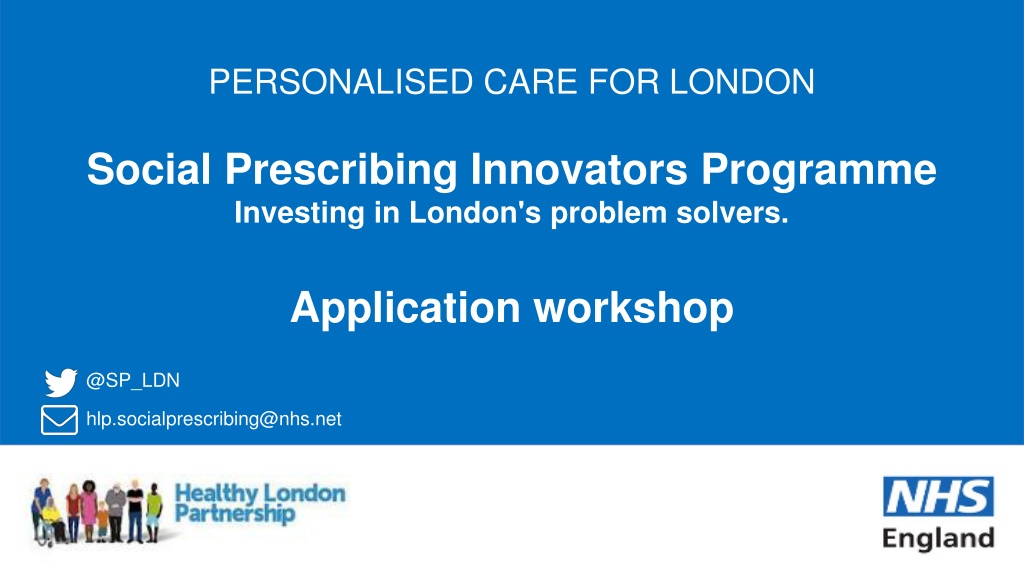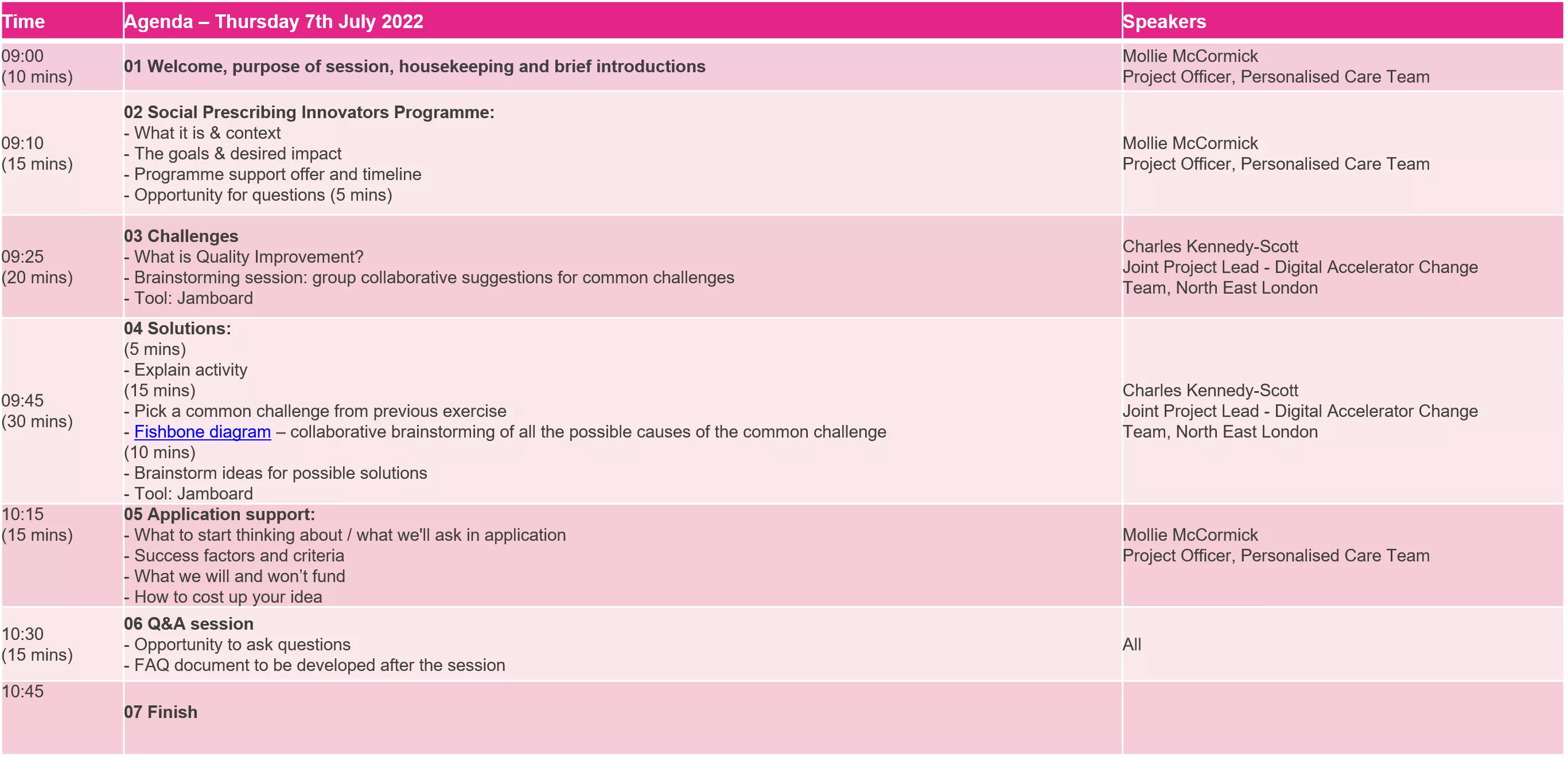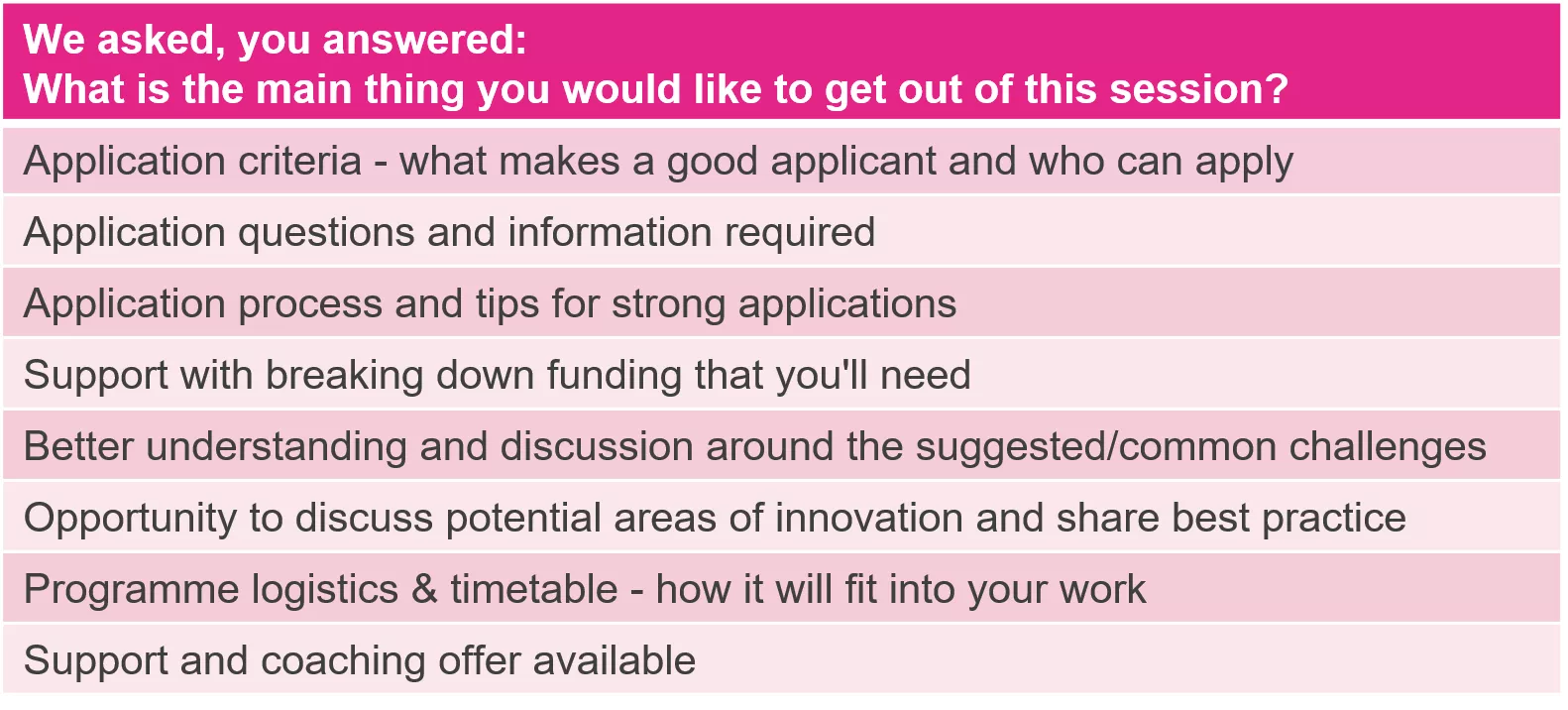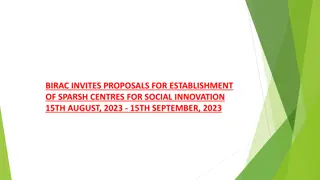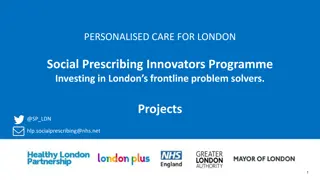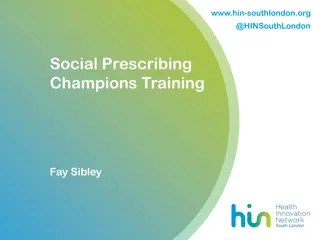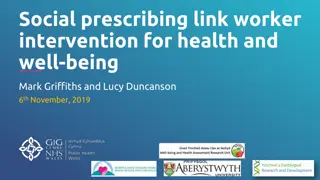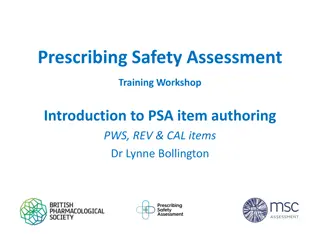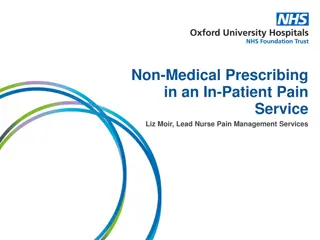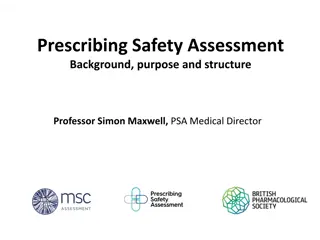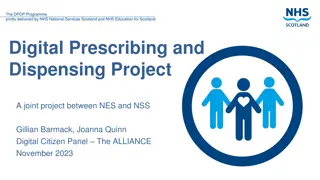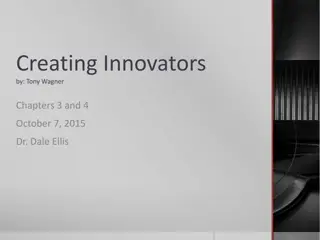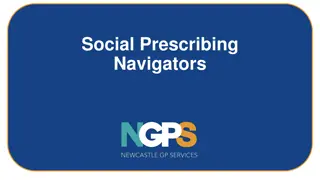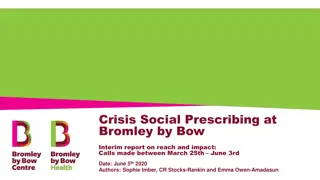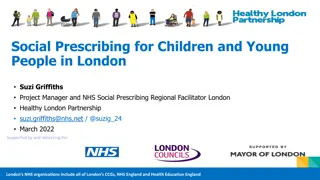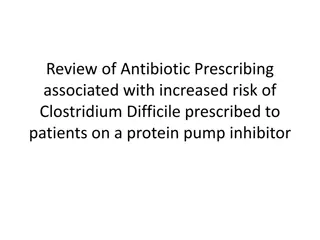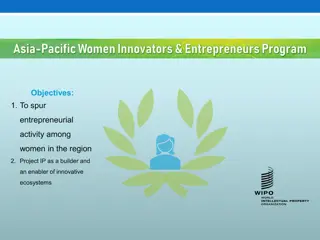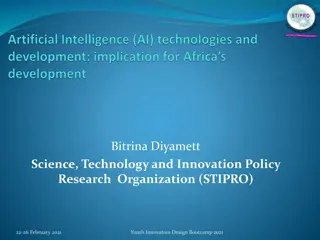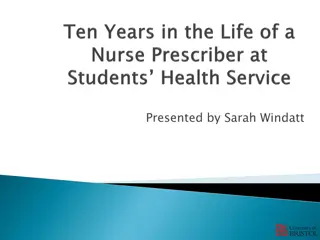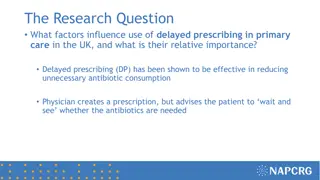London Social Prescribing Innovators Programme Workshop
Join the London Social Prescribing Innovators Programme workshop to learn about the programme, application process, support offered, and network with others in the field of Social Prescribing. Get insights on writing successful applications, funding breakdown, and brainstorming solutions for common challenges. Engage with experts and explore opportunities for innovation and best practices.
Download Presentation

Please find below an Image/Link to download the presentation.
The content on the website is provided AS IS for your information and personal use only. It may not be sold, licensed, or shared on other websites without obtaining consent from the author. Download presentation by click this link. If you encounter any issues during the download, it is possible that the publisher has removed the file from their server.
E N D
Presentation Transcript
PERSONALISED CARE FOR LONDON Social Prescribing Innovators Programme Investing in London's problem solvers. Application workshop @SP_LDN hlp.socialprescribing@nhs.net 1
Agenda Time Agenda Thursday 7th July 2022 Speakers 09:00 (10 mins) Mollie McCormick Project Officer, Personalised Care Team 01 Welcome, purpose of session, housekeeping and brief introductions 02 Social Prescribing Innovators Programme: - What it is & context - The goals & desired impact - Programme support offer and timeline - Opportunity for questions (5 mins) 09:10 (15 mins) Mollie McCormick Project Officer, Personalised Care Team 03 Challenges - What is Quality Improvement? - Brainstorming session: group collaborative suggestions for common challenges - Tool: Jamboard Charles Kennedy-Scott Joint Project Lead - Digital Accelerator Change Team, North East London 09:25 (20 mins) 04 Solutions: (5 mins) - Explain activity (15 mins) - Pick a common challenge from previous exercise - Fishbone diagram collaborative brainstorming of all the possible causes of the common challenge (10 mins) - Brainstorm ideas for possible solutions - Tool: Jamboard 05 Application support: - What to start thinking about / what we'll ask in application - Success factors and criteria - What we will and won t fund - How to cost up your idea 06 Q&A session - Opportunity to ask questions - FAQ document to be developed after the session Charles Kennedy-Scott Joint Project Lead - Digital Accelerator Change Team, North East London 09:45 (30 mins) 10:15 (15 mins) Mollie McCormick Project Officer, Personalised Care Team 10:30 (15 mins) All 10:45 07 Finish 2
Purpose of the session Get a taster of the programme structure and offer of support Learn more about the programme, the goals and target impact Receive support with writing a successful application and information on application processes Build connections and network with others working within Social Prescribing Crowdsource shared challenges in delivering an impactful service Ask any questions about the programme We asked, you answered: What is the main thing you would like to get out of this session? Application criteria - what makes a good applicant and who can apply Application questions and information required Application process and tips for strong applications Support with breaking down funding that you'll need Better understanding and discussion around the suggested/common challenges Opportunity to discuss potential areas of innovation and share best practice Programme logistics & timetable - how it will fit into your work Support and coaching offer available 3
Housekeeping Please be mindful of general virtual housekeeping rules 4
What is it? Social Prescribing Innovators Programme The Programme aims to support Social Prescribing services and individual Social Prescribing Link Workers across London to mitigate challenges they face in delivering social prescribing in primary care by testing and sharing innovative ways of working. This is a pilot fund with an award of up to 10k granted to individuals or groups from Social Prescribing services. Successful applicants will benefit from a 6-month programme of support between Sept 22- Feb 23 to help deliver projects against their specified challenge . Funding will be used to support an individual or small team to innovate a solution to their chosen challenge(s), this could involve: Implementing a Social Prescribing service design change Carrying out a local pilot to test solutions to systemic challengesin embedding social prescribing successfully into the health service Develop solutions to specific priorities within the NHS, following the COVID pandemic, including tackling inequalities Projects for this fund will begin in September 2022. Key resources: Online application form Information for Applicants FAQ document in development: to be released Monday 11th July 5
Social Prescribing Innovators Programme Inputs Activities Outputs Outcomes Impact 10/12 projects tackling challenges to effective Social Prescribing Case studies of the approach tested Development of resources that will be useful across the system A toolkit to share with ICSs to run similar programmes focused on improve ment Social Prescribing better embedded and more sustainable Social Prescribing services able to provide an impactful service to London's most disadvantaged commun ities, reducing health inequalities Collective of leaders improving Social Prescribing who can demonstrate its impact 10k grants to be awarded to local Social Prescribing services with chosen challenge Programme of support (including 1:1 coaching, project and developmental support) to take a continuous improvement approach to achieve meaningful change Local Social Prescribing services to test new approaches to old/systemic challenges Community of practice for change makers participating Ad-hoc support and connection building where most needed for each project to support success Better insights into challenges embedding Social Prescribing in PCNs Examples of innovative work to share with other Social Prescribing services System empowered to innovate and develop meaningful solutions A process to enable meaningful bottom-up change on the frontline 6
Programme Offer and Support Successful applicants will benefit from a 6-month programme of support to help deliver projects against their specified challenge . This will include: 4x monthly Quality Improvement training sessions project lead and deputy only (half day) 3x Bi-monthly skills share to support you as a changemaker for all project participants (1.5 hours) 3x Bi-monthly Peer Consulting Group with your programme peers project leads only (2 hours) 3x Bi-monthly 1:1 coaching sessions to develop your leadership in improvement project leads only (45 min) 3x Bi-monthly Board check-in, support and feedback to present on your project and receive support (2 hours) Monthly drop-in support sessions optional ad-hoc support all project participants (1.5 hours) Additional support provided: Cohort Whatsapp group Networking opportunities with cohort as well as wider partners Access to ad hoc support through partners (decision making board) for specialised topics e.g. digital Potential to access further Quality Improvement training or more specialised skills training Opportunity to innovate and explore new ways of working 7
Programme timetable Standard training (mandatory) Peer support Project support Development support Month 1. 1. Preparing for your project Pre-programme support meet (2hr) Aug 1. QI Session 1: Scoping and planning TBC (half day) 1. Monthly HLP led peer support drop ins 1. 2. 1:1 45 min coaching session Peer consulting group 2 hour Sep 1. QI Session 2: Implementing change TBC (half day) 1. Monthly HLP led peer support drop ins (same day as skills share) 1. Board check-in and support and feedback 1. Skills share ( 1.5 hour) Oct 1. QI Session 3: Tracking progress and refining TBC (half day) 1. Monthly HLP led peer support drop ins 1. 2. 1:1 45 min coaching session Peer consulting group 2 hour Nov 1. QI session 4: Measuring success and evaluation TBC (half day) 1. Monthly HLP led peer support drop ins (same day as skills share) 1. Board check-in and support and feedback 1. Skills share ( 1.5 hour) Dec 1. 1. Monthly HLP led peer support drop ins 1. 2. 1:1 45 min coaching session Peer consulting group 2 hour Jan 1. 1. Monthly HLP led peer support drop ins (same day as skills share) 1. Board check-in and support and feedback 1. Skills share ( 1.5 hour) Feb Programme graduation: Sharing success celebration present results and forward plan w/c 27 March 22 Mar 8 All peer, project and development support sessions will be recorded for those unable to attend. Underlined sessions are mandatory to attend
The decision making board A collective of leaders who can support us throughout the project lifecycle to: 1. Help us decide who to award funds to 2. Share feedback on the programme and processes of the Innovation Fund, to inform the Pilot, as well as the refined 23/24 fund 3. Champion your areas of expertise by supporting successful applicants, connecting them with people in your network that might be able to support 4. Help us promote the programme to those in their network Name Role Organisation Specialty areas Zlatina Nikolova SPLW, SP Advocate Age UK Islington Social prescribing, VCSE OneWestminster Kateryn Florez SPLW Social prescribing, VCSE, Psychology Nirja Joshi GP, Fellow, SWL Long Covid Education Champion Wandsworth Training Hub Social prescribing improvement, Long COVID, Clinical, Primary Care Liz Ayres Lead Transformation Programme Manager (Kingston and Richmond) SWL CCG Transformation, Commissioning, Health Inequalities, ARRS Suzi Griffiths Project manager Healthy London Partnership CYP, Social Prescribing, Local Authority Devika Vadher Senior Manager - Personalised care London NHSEI London Region Personalised Care, NHS, Digital Social Prescribing, Public health, Primary care, Dental Stephanie McKinley London Social Prescribing Network Manager LondonPlus VCSE, Green SP, Thriving Communities, Partnerships, Physical activity SP, Cost of Living crisis Anthony Atherton Peer Leader NHSEI Coproduction Dan Hopewell Director of Innovation Bromley By Bow Centre Innovation, Data and evaluation, Social Prescribing, Service design, Research, Population Health, Health Creation and communities Jagan John GP (Aurora Medcare) GPWSI in Cardiology ( BDCHS) Personalised Care Clinical Lead Clinical Chair Barking &Dagenham Chair NEL CCG NEL ICS ICS, Clinical, Social Prescribing, Leadership, Primary Care, Cardiology Thomas Kador Lecturer in Creative Health, researcher, lead for Creative Health MASc University College London Academic, research, ARRS, Social Prescribing, Evaluation, Creative health, Health inequalities, mental health, wellbeing 9
Timeline Dates for your diary Activity Social Prescribing Innovators Programme launch publish guidance and application form Application workshop and Q&A Timeframe (date and time where applicable) Wednesday 22nd June 2022 12 noon Thursday 7th July 2022 9-11am Release of application workshop recording Monday 11th July 2022 Deadline for applications Wednesday 20th July 2022 12 midnight Clarification period Monday 25th Friday 29th July 2022 Outcome of applications communicated Week commencing 8th August 2022 Deadline to accept offer of programme place and confirm programme team names Programme launch Monday 15th August 2022 12 midnight Monday 5th September 2022 Programme wrap-up Tuesday 28th February 2023 Showcase projects March 2023 10
PERSONALISED CARE FOR LONDON 03 Challenges Link to Jamboard @SP_LDN hlp.socialprescribing@nhs.net 11
PERSONALISED CARE FOR LONDON 04 Solutions Link to Jamboard @SP_LDN hlp.socialprescribing@nhs.net 12
PERSONALISED CARE FOR LONDON 05 Break @SP_LDN hlp.socialprescribing@nhs.net 13
PERSONALISED CARE FOR LONDON 05 Application @SP_LDN hlp.socialprescribing@nhs.net 14
Application Guidance What to expect Section D: QI Team Assessment scale of 1-5 1. I or the project team have worked on improvement projects before. 2. I or project team are proactive and willing to try new techniques. 3. I or the project team have diverse professional backgrounds and experiences. 4. I or project team have a good understanding of coproduction and use this approach in our work. 5. I or the project team have the authority to make all decisions required as part of this project, or have buy-in from someone who can. 6. I or project team have the time to dedicate to the 6-month support programme and towards developing an improvement project. Section A: About you Full name, organisation name, organisation type Job title or role and the job titles/roles of all those in group (if applicable) Contact details Section B: About your proposal 1. The challenge and why it's a problem 2. Why existing solutions are insufficient 3. Other possible solutions to overcome the challenge 4. People, resources or partners needed to make this a success 5. How to engage local communities and partners to coproduce 6. Impact of solving this problem and how it will be measured 7. How project learnings will benefit other services 8. How approach will support current priorities in the NHS 9. How approach will tackle health inequalities 10.How it could be scaled to other areas Section D: QI Team Assessment qualitative questions 1. What does Quality Improvement mean to you? 2. What are the relevant skills and experience you (and your project team) can bring to working on an improvement project? 3. Please provide a list of the specific people who are aware of and will support your involvement in this programme. Please provide all names and job titles. 4. What is your plan for engaging and securing buy-in from key stakeholders in your improvement project? If you need further support or have any accessibility requirements, please get in touch: hlp.socialprescribing@nhs.net Section C: Funding and budget 1. Amount applying for 2. Breakdown of what funding will be used for 3. Any additional funding or added value 15
Application Guidance What would an ideal application look like for the Innovation Programme? Applicants should choose a challenge that impacts their social prescribing service being able to: Have a sustainable workforce Run effectively and efficiently Tackle health inequalities Reduce pressure on other NHS services In the application you will be asked for some suggested solutions to your chosen challenge. There is ringfenced funding specifically for projects related to recruitment and retention. With this in mind, we will prioritise applications looking at challenges to this as well as those in two other priority areas: Access and Impact. Challenge theme Example challenges Recruitment and retention Lack of progression in the SP service leading to well embedded SPLWs moving onto other roles Lack of access and uptake of social prescribing among specific cohorts of people e.g. refugee populations Access social prescribing reaching the right people Lack of consistent collection of data to inform around who is likely to benefit most from SP Impact demonstrating the benefit of social prescribing 16
Application Guidance Successful applicants will need to demonstrate the following in their application: 1. A clear understanding of the challenge(s) to social prescribing: a) How it creates a barrier for social prescribing to thrive b) How the challenge(s) may be widespread 2. A broad understanding of the existing solutions: a) How they are insufficient 3. Creative and strategic thinking in suggested alternative solutions a) Goals/outcomes of suggested solutions that are appropriate, feasible and achievable b) Project planning, deliverables and risks 4. A good idea of the people, partners and resources required to enable this work and why a) How you plan to engage them 5. A strong understanding of coproduction and how to apply it 6. How overcoming the challenge(s) will have a positive impact, in particular on: a) Tackling health inequalities b) PCN work 7. A clear understanding of and ability to carry out evaluation, specifically in terms of: a) How to measure impact b) Data collection and analysis 8. That you have considered how the learnings from this programme could be shared and a willingness to scale solutions 9. An understanding of the current priorities within the NHS and how the solution can support 17
Application Guidance Key criteria There is an online application process, launching 22nd June. The application form can be found here. If you have any accessibility requirements, we are keen to support, please get in touch: hlp.socialprescribing@nhs.net The deadline for submitting is 12 midnight on Wednesday 20th July 2022 Expectations Part of an organisation that is based in London - please note, we will be looking for a geographical spread of projects across London. Projects should focus on solutions to support Social Prescribing service design - not funding voluntary/community sector activities which individuals are referred to. The Innovators programme is an opportunity to lead a 6-month pilot project between September 2022 and February 2023 and participants will be expected to share outcomes and learnings publicly. Participants must be willing to publicly share outcomes and learnings at the end of their project - even if key deliverables are not achieved. The application deadline is midnight on the 20th July 2022. Projects and programme support will commence in September 2022 and will run until February 2023. Participants need to be able to commence projects and programme support at the beginning of September 2022 and have capacity to commit to the 6 month programme. Must have a direct link to Social Prescribing. Attend all mandatory sessions. 18
Application Guidance What can you spend the money on? Funding can go towards Staff salaries Funding can't go towards Voluntary/community sector activities alone Activities that replace government funding Political activities Retrospective costs Loan repayments Any activities that generate profits for private gain Equipment Organisational development and training Small-scale refurbishment Any running costs Project activities 19
Application Guidance How to cost up your idea? Coming to the programme with a challenge rather than a fully agreed solution makes it more difficult to cost up the project. The steps below will help you consider how much you could need. 1. Brainstorm some of the possible solutions to your challenge 2. Do any of these solutions require buying something? E.g. an information system, space 3. Do any of these solutions involve bringing in a specific role? E.g. a community development worker for 3 months 4. What capacity of the team members is required to develop the solutions? Could you cost this? 5. Do you need extra project management support? Could you cost this? 6. Is there any additional expertise you might need for the process or solution? E.g. costs for a data analyst or graphic designer Example costs: Staff costs: e.g. A SPLW for 3 months = 7.5k Evaluation support: e.g. Data analysis and evaluation support = 2k Comms output: e.g. Video production cost = 500 - 1.5k 20
PERSONALISED CARE FOR LONDON 06 Any Questions? @SP_LDN hlp.socialprescribing@nhs.net 21
